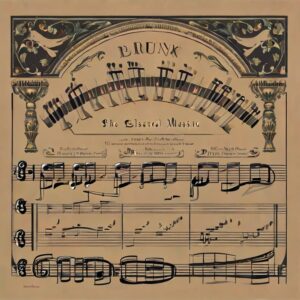Cognitive Boost Like No Other

The intriguing concept of the “Mozart Effect” has piqued the interest of many, leading to a broader examination of how classical music influences our mental faculties. This phenomenon, rooted in the idea that exposure to the complexities and harmonies of classical compositions could bolster cognitive functions, extends beyond anecdotal evidence. Research into this area suggests that the intricate patterns and structures inherent in classical music stimulate brain function, potentially aiding in tasks that require higher levels of concentration and problem-solving capabilities.When we immerse ourselves in the soothing world of classical melodies, our minds may enter a state more apt for absorbing information, understanding abstract concepts, and engaging in creative thought processes. The music acts as a catalyst, synchronizing with our brain’s own rhythms and creating a backdrop that enhances our ability to focus, retain, and process information more effectively. This cognitive boost is not limited to the realms of IQ or spatial reasoning, it extends to improving memory retention, elevating mood, and even reducing stress levels, all of which contribute to a more productive learning or working environment. Classical music, with its rich tapestry of sounds, does more than please our ear; it nurtures our brain’s capacity for growth and efficiency.
Emotion, Meet Classical Music
The emotional resonance that classical music fosters goes far beyond surface-level feelings, tapping into the core of our emotional psyche. As the grandeur of a Beethoven symphony swells or the plaintive melodies of a Chopin nocturne linger in the air, listeners are not passive recipients but active participants in an intricate dance of emotions. This immersive experience, backed by scientific research, underscores how classical compositions can stir a spectrum of deeply felt emotions, from elation and joy to profound melancholy and serene peace. The dynamic range and depth of classical music serve as a powerful conduit for emotional expression and exploration, offering a unique auditory journey that can move us to tears, inspire us to action, or envelop us in a comforting embrace of calm.
Engaging with these complex emotional narratives through music can be incredibly beneficial for our emotional intelligence. It acts as a form of emotional training, enhancing our capacity to identify, articulate, and navigate our own emotions with greater nuance and understanding. By experiencing the rich emotional landscapes evoked by classical music, we learn to appreciate the subtleties of our emotional responses and develop a refined ability to discern and appreciate the emotional cues in others as well. This heightened emotional awareness can enrich our personal relationships, improve our empathetic engagement with the world, and foster a deeper, more introspective understanding of our own emotional states. Classical music doesn’t just touch our hearts; it enriches our emotional world, strengthening our ability to process and express emotions with sophistication and depth.
The Therapeutic Harmony
The therapeutic harmony of classical music extends its reach well beyond the alleviation of stress or the easing of sleepless nights; it ventures into more profound realms of healing, both psychological and physical. The use of classical music as a cornerstone in music therapy has uncovered its profound impact on a multitude of health conditions. For individuals grappling with anxiety and depression, the melodic structures and rhythms found in classical pieces can act as a musical balm, lowering levels of stress hormones in the body and inducing a state of calmness and well-being. This is not a subjective experience but is supported by clinical research indicating significant reductions in symptoms when classical music is incorporated into treatment plans.
The application of classical music in therapy goes beyond mental health. Stroke survivors, for example, have shown remarkable progress in their recovery when classical music therapy is part of their rehabilitation regimen. The rhythmic cues of the music can facilitate motor control and coordination, helping to retrain the brain in the complex processes of movement and balance. Additionally, the cognitive stimulation provided by engaging with music can support the recovery of speech and cognitive functions that are often impacted by stroke.
The benefits of classical music as a therapeutic tool also extend to pain management. Patients who listen to classical music post-surgery or during painful medical procedures report experiencing less pain and discomfort, attributed to the music’s ability to divert attention away from pain stimuli and evoke emotional responses that release natural pain-relieving chemicals in the brain. The structured nature of classical music can foster a healing environment, reducing the sense of chaos and unpredictability that often accompanies illness and hospitalization.
The contributions of classical music to the field of therapy are multifaceted, offering not just a refuge of calm and relaxation but also a powerful ally in the rehabilitation and recovery processes for a wide range of health issues. Its capacity to touch the deepest fibers of our being makes classical music a valuable companion in our journey to physical and mental well-being, showcasing its role not just as an art form but as a vehicle for healing and restoration.
Stress Reduction on a Note
Stress often takes a toll on our physical and emotional well-being, making the quest for tranquility more crucial than ever. Enter the serene and sublime world of classical music, stepping in not just as an opus of cultural heritage but as a formidable force against the clenches of stress. The power of classical music to reduce stress is not just a matter of subjective experience but is firmly rooted in scientific research. Listening to the harmonious and soothing melodies of classical compositions has been shown to trigger significant physiological changes within the body – a decrease in blood pressure, a reduction in the levels of cortisol (the stress hormone), and a slower heart rate are among the notable benefits. These changes collectively contribute to a profound state of relaxation that can be elusive in our daily hustle and bustle.
